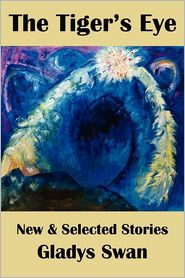Library Director’s Notebook
December, 2011
In her latest collection, The Tiger’s Eye: New and Selected Stories, Gladys Swan continues to write about people living on the edge, whether that edge is defined as social, financial, or psychological. Reviewers of Swan’s stories often note her compassion and her empathy, something a writer needs if she is going to explore the inner lives of characters, some of whom may not automatically be regarded sympathetically by some readers.
We often talk about good writers being able to see inside the heads of their characters. I think Swan takes this a bit further. In her stories we, the readers, are able to look out through the eyes of her characters at their world. As we read, we see the world from their inner perspectives, even if we might regard their point of view as somewhat odd or skewed from our own.
It doesn’t really matter, in the world of Swan’s stories, whether the characters are perceiving reality or are caught up in some extensive fantasy. For example, in the title story “The Tiger’s Eye”, it’s hard to decide whether we are to suspend our disbelief and assume a tiger is talking to an old man; or whether the tiger’s tale is all in the imagination of a very lonely person. Either way, the impact of the story is to feel great, unleavened sadness for a man’s life.
Swan conveys her great empathy for all her characters, with insight of rapier accuracy, as in “Venus Rising”: “When his wife was alive he frequently left her words hanging in the air as though she’d spoken them to herself, or the cat or the chair he sat in. Very likely she was used to this for she seldom said ’Did you hear me?’, or gave any sign that she expected an answer. Now it seemed as if she’d left her utterances still hanging in the air, a sort of ghost speech that, given just the right atmosphere, was stirred into sound again.”
The best writers notice things, finding meaning in the most quotidian of objects . In “Losing Game”, we are immediately pulled into the gritty life of Jason Hummer: “Turn the things out of a man’s pocket and take their testimony: a soft brown leather billfold worn to limpness without ever having been made fat with prosperity, home of a few snapshots, Social Security Card, driver’s license, expired; a gadget combining pocket knife, corkscrew and can opener; a book of matches, a pocket comb with teeth broken out … a letter, the last his father had written, the address more than five years old; two quarters, three dimes and four pennies. His belongs, down to the lint in his pocket.”
Some of the stories in The Tiger’s Eye might be said to have “endings”, but most of them don’t end in a dramatic or even emphatic way. We know that these people are dealing with a lot and that somehow or other they’re going to have to keep dealing with it. Our own lives rarely come packaged with neat endings. The ache in these stories is true, and so is the laughter.





